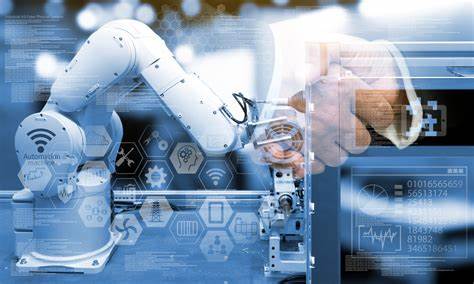The advent of robotics represents a revolution in both industrial processes and everyday life, with robots playing increasingly vital roles in various sectors. From manufacturing and healthcare to transportation and entertainment, robots are transforming how tasks are performed, making operations more efficient, accurate, and adaptable. In this article, we’ll explore the applications of robotics in industry and daily life:
- Industrial Automation: Robotics has revolutionized industrial automation, enabling factories to streamline production processes and improve productivity. Industrial robots perform tasks such as assembly, welding, painting, and material handling with precision and consistency, reducing errors and increasing output. By automating repetitive and labor-intensive tasks, robots help companies enhance efficiency, quality, and safety in manufacturing operations.
- Collaborative Robotics (Cobots): Collaborative robots, or cobots, work alongside humans in shared workspaces, performing tasks that require close collaboration and interaction. Unlike traditional industrial robots, cobots are designed to be safe and easy to program, allowing workers to operate them directly without the need for specialized training. Cobots are used in industries such as automotive, electronics, and healthcare to assist with tasks such as assembly, packaging, and inspection, enhancing productivity and flexibility on the factory floor.
- Medical Robotics: Robotics plays a crucial role in healthcare, where precision, accuracy, and minimally invasive techniques are essential. Surgical robots, such as the da Vinci Surgical System, enable surgeons to perform complex procedures with enhanced dexterity and precision, leading to shorter recovery times and improved patient outcomes. Other medical robots assist with tasks such as medication delivery, patient monitoring, and rehabilitation, enhancing the quality of care and reducing the workload on healthcare professionals.
- Service and Hospitality Robots: Robots are increasingly being used in service and hospitality industries to enhance customer experiences and streamline operations. In hotels and restaurants, robots serve as concierges, waiters, and cleaners, providing assistance and performing routine tasks. In retail, robots assist with inventory management, restocking shelves, and guiding customers through stores, improving efficiency and customer service. Service robots also play roles in entertainment venues, airports, and public spaces, offering information, entertainment, and assistance to visitors.
- Agricultural Robotics: Agriculture is another sector where robotics is making significant advancements, addressing challenges such as labor shortages, rising costs, and the need for sustainable practices. Agricultural robots perform tasks such as planting, harvesting, and weeding crops autonomously or with minimal human intervention, improving efficiency and reducing the environmental impact of farming. Robots equipped with sensors and cameras can also monitor crop health, soil conditions, and environmental factors, enabling farmers to make data-driven decisions and optimize crop yields.
- Personal and Domestic Robots: Robotics is entering the realm of personal and domestic use, with robots designed to assist with household chores, caregiving, and companionship. Domestic robots vacuum floors, mow lawns, and clean windows, freeing up time for homeowners to focus on other tasks. Caregiving robots assist elderly or disabled individuals with daily activities such as dressing, bathing, and medication reminders, providing support and assistance to improve quality of life. Companion robots offer social interaction and entertainment for individuals of all ages, fostering companionship and emotional well-being.
- Challenges and Considerations: While the applications of robotics are vast and diverse, there are challenges and considerations to address, including safety, ethical concerns, and job displacement. Ensuring the safety of robots in shared workspaces and public environments is paramount to prevent accidents and injuries. Ethical considerations surrounding the use of robots in healthcare, surveillance, and military applications must also be carefully examined to ensure that robots are deployed responsibly and ethically. Additionally, there is a need to address concerns about job displacement and workforce transitions as automation and robotics continue to evolve.
In conclusion, the widespread adoption of robotics is reshaping industries and transforming daily life in profound ways. From industrial automation and healthcare to service industries and domestic use, robots are enhancing efficiency, productivity, and quality of life across various sectors. As robotics technology continues to advance, it is essential to address challenges and considerations surrounding safety, ethics, and workforce implications to ensure that robots are deployed responsibly and contribute positively to society.

